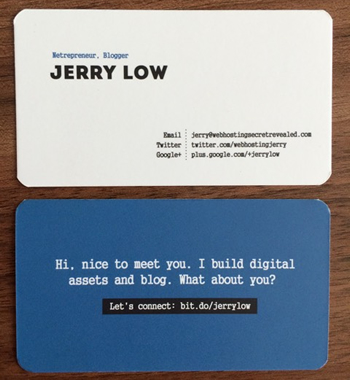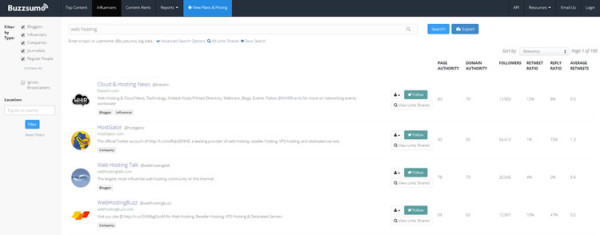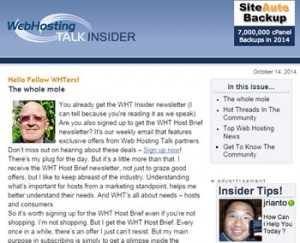By Jerry Low, Published November 1, 2014

Yeah, yeah – I know, we’re not supposed to brag. But, there’s a difference between bragging and a bit of shameless shilling or self-promotion. For starters, bragging makes people feel badly. Self-promotion – if done right – just makes them want what we’re selling. Not to mention that self-promotion is simply a necessity in our business – and it’s hardly a sin.
Think of it this way: companies take out advertisements, restaurants distribute menus and coupons. Bloggers could (in theory) use these promotional avenues… but I don’t think the ROI would be great. That said, it’s important that we bloggers use what we do have available to us (with decent returns) – the power of self-promotion…
After all, if you don’t promote yourself, who will?
As bloggers, our businesses exist on the web – so it only makes sense that we should promote ourselves on the web, too. Here are a few great venues for self-promotion.
1. Social media
Social media is a great way to connect with like-minded people and to find your fans. Twitter, Facebook, and LinkedIn are all well-known venues – which means there are lots of potential connections waiting to be made.
If you’re just getting started, you may want to consider tapping into other influencers’ networks to learn how they are successfully promoting themselves. Watch what they do – how do they interact with their followers, how do they drop their links and business into comments, and how do they leverage their own feeds? Watch to see what works – then leverage your learnings into your own social media efforts.
Take action: Find influencers in your industry
Of course, to watch those influencers, you need to know who they are… Buzzsumo is a great tool to learn just that. With Buzzsumo, you can filter out influencers in your industry based on their number of followers and Twitter retweets.
2. Forums
With the exception of the Internet marketing forum, forum members in other niches are typically very friendly and receptive to others posting quality, useful, relevant content. Additionally, the moderators tend to be okay with senior members contributing – and link dropping (provided the links and contributions are relevant, of course).
Relevancy is key to using forums to your advantage.
For example, if you are running a mommy blog, you might consider checking out cooking or childcare forums – they are likely to have topics relevant to your blog and readers that are interested in said topics. You might find a thread discussing do’s and don’ts for breastfeeding or a quick, easy, healthy dinner recipe exchange – odds are, you’ll have something relevant and interesting to contribute… in which case you can add your contribution along with a link back to your blog where they can find more information.
Also key is avoiding spam – don’t post on every thread a link to your blog.
Your goal is to be useful to the community and only drop that link when it either legitimately adds value to the discussion at hand or when a member asks for it.
Take action: Find active forums in your niche
Again, to post on relevant forum threads, you first need to find them. Try searching:
“inurl:/forum + key terms”, “inurl:/vbulletin/ + key terms”, and so on.
For example, if you’re offering up a burger recipe, you’d search “inurl:/vbulletin/ + burger recipe” – or, if you’re looking to share blogging tips, you’d search “inurl:/forum/ + blogging tips” – and so on.
3. Newsletter
Newsletters are a great way to connect with readers outside of your actual blog, furthering your value to them.
Firstly, you’ll need a way to collect those email addresses – your blog is great for this. A simple one-field form for them to enter their email address with a quick one-liner will do the trick. As for the newsletter itself, you need to find a way to make it interesting so that people actually read it… and want to continue reading.
Nothing’s more interesting to readers than a chance to get to know the writer – so don’t be afraid to share personal information. This is why I never miss the Web Hosting Talk’s newsletter – it’s consistently interesting and I feel like I get to know the writers.
Real life example: Dennis Johnson of Web Hosting Talk
This is how Dennis Johnson wrote about the moles in his yard to his subscribers recently –
Quoted from Web Hosting Talk Newsletter (October 2014, The Whole Mole)
…I just wish it included tips on getting rid of moles from my yard. I thought I had them under control – and I did. Then – suddenly – after a few years of being mole free, they returned about a month ago. They just didn’t return, they brought their whole family! All the kids, aunts and uncles, grandparents, everybody! I can’t hardly walk in my yard because of all the mole trails I fall through. I have a tough enough time walking without the added obstacle of all of a sudden stable ground is much further down than it appeared…
4. Attend a conference
Conferences are a great way to meet potential readers – and, since you’ll no doubt attend a conference relevant to your blog topic, those potential readers are all relevant potential readers. Extend the reach of this self-promotion opportunity by bringing those business cards from tip #5 and hashtagging away those social media posts from tip #1.

5. Business cards
Yes, your business exists online – but you live in the physical world.
You’re bound to meet people in your industry – particularly if you attend networking events or industry mixers. Keeping business cards on hand isn’t just a convenient way to share contact info – it provides a level of legitimacy and professionalism to your blog.
6. Network at trade shows
Trade shows exist at pretty much every conference and sometimes even as standalones.
You know what’s great about trade shows? Everyone there is either looking to sell or looking to buy. You as an attendee have the opportunity to start up a discussion with all of the vendors – not to mention other attendees who are there in shopping mode. Have those business cards ready.
7. Issue a press release
Press releases are a great relatively low-cost (and at times free) way to promote your blog. Anyone can find releases online and if yours is newsworthy, it may even get picked up and covered by a news outlet. To extend your outlet’s reach and increase its likelihood of getting picked up, personally send it with a short pitch to relevant media – industry publications or sites, as well as local media are all good options.
The key is to offer something newsworthy – be it a new service or offering launch, event, announcement that you’ll speak at an event, giveaway or sweepstakes – you get the idea.
Over to you
There are countless ways to promote yourself and drive new traffic to your blog – and better yet, many of them come with no price tag.
So what are you waiting for? Get out there and start shilling on your own behalf.
Social Articles | Business 2 Community
(1091)
Report Post






